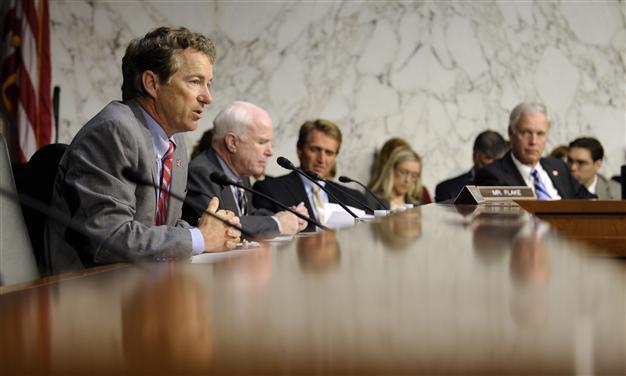US Senate panel approves use of force against Syria
WASHINGTON - Reuters

Senate Foreign Relations Committee members, from left, Sen. Rand Paul, R-Ky., Sen. John McCain, R-Ariz., Sen. Jeff Flake , R-Ariz., and Sen. Ron Johnson, R-Wis. listen on Capitol Hill in Washington, Sept. 4. AP photo
The U.S. Senate Foreign Relations Committee approved a resolution on Sept. 4 authorizing a limited U.S. military intervention in Syria, setting the stage for a debate in the full Senate next week on the use of military force.
The committee voted 10-7 in favor of a compromise resolution that sets a 60-day limit on any engagement in Syria and bars the use of U.S. troops on the ground for combat operations.
The compromise is more limited than President Barack Obama's original proposal but meets the administration's goal of punishing Syria for what the U.S. government says is the use of chemical weapons on Syrian civilians, killing more than 1,400 people.
The authorization still faces significant resistance in Congress, where many lawmakers fear it could lead to a prolonged U.S. military involvement in Syria's civil war and spark an escalation of regional violence.
The full Senate is expected to vote on the resolution next week. The House of Representatives also must approve the measure.
Obama and administration officials have pushed Congress to act quickly, saying U.S. national security and international credibility is at stake in the decision whether to use force in Syria to punish President Bashar al-Assad's government for chemical weapons use.
Initial resolution too 'open-ended'The committee vote came after the two panel leaders - Democratic Chairman Robert Menendez and senior Republican Bob Corker - crafted a compromise to meet concerns from some lawmakers that Obama's resolution was too open-ended.
Republican Senator John McCain of Arizona had objected to the more narrow wording. But the committee adopted amendments proposed by McCain with policy goals of degrading al-Assad's ability to use chemical weapons, increasing support for rebel forces and reversing battlefield momentum to create conditions for al-Assad's removal.
Many lawmakers have said they are worried the resolution could lead to U.S. ground troops, or "boots on the ground," in Syria - which administration officials said would not happen.
